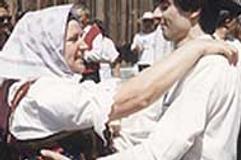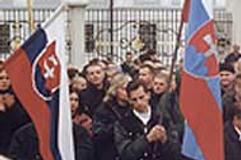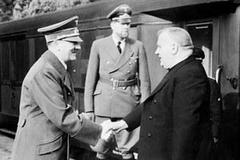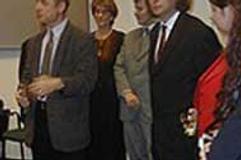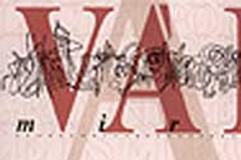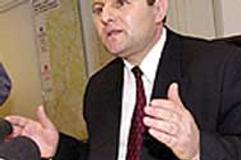Archive of articles - March 2000, page 2
If you desire to read an old article, use the search bar or select the publication date.
Road construction companies struggle to survive
Road construction firms both big and small say the state of the industry today is dire. "I don't even want to talk about it," said Dušan Masaryk, financial director of Slovasfalt, a Bratislava-based road construction company.Gone are the days when the state under Prime Minister Vladimír Mečiar took huge loans to pay for highway projects that were busily finished before election day. Instead, a more fiscally responsible new government halted construction plans in 1999 causing a massive decline in the construction industry. Besides lack of business, firms face the added task of collecting money for work already done, creating a vicious circle in which no-one can pay anyone.
Review: Kráter: Misguided attempt at class
Bratislava cannot exactly boast a plethora of late-night dance clubs. Those determined to get down in the wee hours of the night have only about five options, all of which pretty much fit into two categories:1) Those featuring teenage girls in hot-pants dancing frantically with gawking males looming nearby.2) Those dominated by large, short-haired men of suspect repute, the kind of men who go to clubs flaunting cell phones, Mercedes-Benz key-chains and the courage to wear Nike jump-suits on a Saturday night.Kráter, a restaurant-by-day, club-by-night establishment on Vysoká ullica (an arcing side street off Obchodná ulica) falls into the latter category.
Tiso boosters then and now: The lessons of history examined
Another March 14 has come and gone, the day every year when a few sullen skinheads and misguided oldsters around Slovakia get together to hail the memory of Jozef Tiso, the leader of the country's World War II 'independent' republic. Each year, Slovak society seems to make further progress in examining and judging the nature of that wartime state, and this past week was no exception - the fact that an international conference of rabbis had the confidence to meet in Bratislava on March 14, and the extent to which police were mobilised to protect them from Tiso-intoxicated skinheads, shows that the country may be close to making its final peace with the crimes committed in Slovakia from 1939 to 1945.
False data feeding anti-reformers
As doubt spreads about the accuracy of official data on Slovakia's jobless rate and real wages, the gaps in the numbers are beginning to interest more than economic analysts. Some Slovak politicians and foreign investors now say that the exaggerated figures may be pushing leftist parties to stiffen their resistance to reform, and encouraging them to protect citizens from 'threats' that don't really exist.Most criticism has been focused on the country's unemployment rate, which according to Labour Office estimates hit a record 20.5% this January. Both government and independent analysts have put the real figure closer to 15%, saying about 150,000 of Slovakia's current 550,000 registered unemployed actually work on the side (see story, page 1).
Clear message key to recruitment
Inspired by some of the responses my February column has provoked, I would like to look into some other aspects of the psychological contract that is so much a part of managing human resources, recruitment in particular.Regardless of what information is actually presented during the recruitment process, it is better when both the employer and applicant describe the position to be filled in a clear and comprehensive manner. The message itself thus pre-selects the candidates, since it fails to attract those whose abilities and interests are a poor match for the position offered.
Advisors boost faith in state tenders
One of the goals set in 1998 by the government of Mikuláš Dzurinda was to gain the trust of international organisations like the European Union, the OECD and NATO as well as that of international investors. One of the most crucial steps towards meeting this goal has been the hiring of respected foreign advisors to manage the privatisation of the state's most lucrative remaining assets.Big names like JP Morgan, chosen to manage the privatisation of the state banks SLSP and VÚB last December, have been complemented recently by CA IB, chosen to oversee the sale of troubled bank IRB at the end of February, and Deutsche Bank, selected last year to handle the sales of stakes in Slovak Telecom and VSŽ steelworks.
At 83, Andrašovan still promoting Slovak culture
Composer Tibor Andrašovan has been a legendary figure in the Slovak cultural and musical scene for over 50 years. Born in 1917 in eastern Slovakia's Slovenská Ľupča as the youngest of five children, he grew up in Banská Bystrica and later moved to Bratislava before embarking on travels across the globe.His resumé is remarkable: pianist and conductor for the Slovak National Theatre in Bratislava from 1945 till 1957, co-founder of the Slovak folklore group Sľuk, author of the first Slovak ballet (Orpheus a Eurydice), 6 operas and music scores to 160 Slovak films. He has even composed music for Asian royalty, and in 1957 wrote the musical score for the Egyptian national anthem.
Tiso-led state revered, vilified
On March 14, 1939 the first independent Slovak state was created with the backing of Nazi Germany. Sixty-one years later, the country's citizenry was still divided on whether to celebrate the anniversary or vilify the state and its leader Jozef Tiso as fascist and anti-Semitic.The anniversary has traditionally seen gatherings in the nation's capital in support of both sides, and this year was no different. Slovak Police Vice-President Jozef Petráš said his forces had been mobilised in response to the heightened threat of riots during the planned March 14 demonstrations and in order to assure the protection of the 170 European rabbis holding a conference at the Hotel Danube (see story, page 1).
From our archives: The Slovak state, 1939-1945
Few events in Slovak history remain as controversial as the decision of the Slovak provincial assembly on March 14, 1939 to declare independence from Nazi-dominated Czecho-Slovakia.
Asian Cuisine
JasminHua Li Gong Mekong Tsing Tao U Dežmára Tokyo Sushi Bar Tokyo
Infovek gets 35 million crown gift
Thanks to parliamentary lobbying by members of the ruling coalition Party of the Democratic Left (SDĽ), Project Infovek - a plan which hopes to provide Internet access to every secondary and primary school in Slovakia within five years - has been given a huge cash boost. While requesting only 45 million Slovak crowns from the Education Ministry's budget for the year 2000, Infovek was actually given 80 million Slovak crowns ($1.8 million) in the state budget approved last December, a full 35 million crowns more than their original request."We are extremely excited," said Beata Brestenská, the director of Infovek's education division. "We feel very positive about the future of Project Infovek."
Rabbis meet under tight guard
Metal detectors and masked police gunmen on the roof of Bratislava's Hotel Danube greeted rabbis on March 12 for the start of their 22nd bi-annual European conference. The biggest Jewish conference in Slovakia since the 1930s was under tight security because of the planned March 14 demonstrations by Slovak skinheads to honour the establishment of the first Slovak state.Originally scheduled for Vienna, the March 12-15 conference was moved to Slovakia in February in protest of Austria's inclusion of Jörg Haider's nationalist Freedom Party in the government coalition. But the nationalist rallies outside were a stark reminder that Slovakia too still had far-right fanatics to deal with .
News Briefs
Slovaks officially to open eight EU chaptersFormer secret service leaders suspected of treasonDzurinda: Civil service archaic and needs reformAlmost 13% of Slovaks use Internet - poll
Review: Realism during communism
Western-born foreigners tend to believe that artistic growth in central and eastern Europe came to a standstill during four decades of communism. One imagines oppressively censored artists dully churning out 'popular' works, with a few brave dissidents being carted off to gulags and Siberian coal mines.But The Ground Beneath Our Feet, a moving collection of twenty poems by Miroslav Válek (1927-1991) translated and published in English in 1996, shows that the cultural powers-that-were in Czechoslovakia were not so iron-fisted after all. Poet Válek not only worked under the confines of the erstwhile Culture Ministry - he was himself, in fact, the Culture Minister of the Slovak Republic from 1969 to the Velvet Revolution in 1989.
CORRECTION
In an article entitled "Bratislava regional HQ for big German NGO", by Martina Pisárová, Vol. 6, No. 9, , March 6-12, The Slovak Spectator mistakenly identified the nationality of the German Marshall Fund as German. The Fund is, in fact, American.
Košovan recalled by SE utility board
The Economy Ministry, which holds a 90% stake in energy utility Slovenské Elektráne (SE), used its muscle to fire Štefan Košovan as head of the SE Board of Directors during the board's general assembly meeting on March 14. The decision was taken on the basis of the ministry's four month investigation into SE's operations, an audit launched last November after questions were raised by the Slovak Democratic Coalition (SDK) and other government members about Košovan's leadership of the utility.According to Economy Minister Ľubomír Harach, a member of the SDK, the audit showed faults in the way SE handled tenders, as well as bad financial discipline and shortcomings in budgetary management. The ministry also dismissed two other members of the board of directors and a member of the supervisory board who had been close to Košovan.
Letters to the editor
Gazprom article missed the markThe shocking truth about cross-cultural marriagesToo many unqualified 'native speaking' teachers
Community Calendar
English-language Catholic MassInternational Women's Club BratislavaAmerican Chamber of CommerceHash Run
Shadow economy shades real picture
Too often, doing business or getting things done quickly in Slovakia leads to practices that, though illegal, are commonly accepted as a means of survival. Tax evasion, doling out bribes at adminstrative centres, giving 'gifts' to doctors or public officials, paying employees under the table - all these practices contribute to a phenomenon known as 'the shadow economy.'Loosely defined, the shadow economy is all economic activity in the country that is not reported to the Tax Office. Economists have put the value of this activity at roughly 10-15% of Slovakia's GDP, or around 90 billion Slovak crowns ($2.1 billion) in 1999.
- Pastoral letter divides Slovaks
- News digest: Slovakia is being hurt by its failure to integrate foreign workers, says auditor
- Hollywood turns Slovak highlands into high-speed playground Video
- News digest: ‘Charlatans and quacks’: Pandemic investigator accuses scientists, pushes for jab ban Video
- Authoritarian echoes from Delhi to Bratislava
- Top 10 events in Bratislava for foreigners
- A café in an ice cellar, sand dunes and a flower shop at the border
- Forget the spa – Bojnice’s trails are the real therapy Photo
- A café in an ice cellar, sand dunes and a flower shop at the border
- Top 10 events in Bratislava for foreigners
- Bratislava opens new support centre for foreigners
- News digest: ‘Charlatans and quacks’: Pandemic investigator accuses scientists, pushes for jab ban Video
- You say nazdar, I say dovi
- Pastoral letter divides Slovaks
- Neuroimmunologist Norbert Žilka: Slovakia in Alzheimer's research premier league
- Hollywood turns Slovak highlands into high-speed playground Video
- Bratislava opens new support centre for foreigners
- Hollywood turns Slovak highlands into high-speed playground Video
- You say nazdar, I say dovi
- A café in an ice cellar, sand dunes and a flower shop at the border
- Top 10 events in Bratislava for foreigners
- Independent cultural space on Bratislava embankment to end soon
- Záhorie uncovered: Slovakia’s quiet corner full of surprises Photo
- Chicken Jockey! Chicken Jockey! Chicken Jockey! Video
- Last Week: And then they came for the NGOs
- What abides: Giving a shit
- Slovakia brings back border checks with Hungary and Austria starting April 8
- Bratislava opens new support centre for foreigners
- Hollywood turns Slovak highlands into high-speed playground Video
- Štítnik resumes hand-crafting Christmas ornaments after 25 years
- You say nazdar, I say dovi
- A café in an ice cellar, sand dunes and a flower shop at the border
- News digest: Slovakia is being hurt by its failure to integrate foreign workers, says auditor
- Forget the spa – Bojnice’s trails are the real therapy Photo
- Košice steelworks sinks deeper into the red
- A 'pink moon' will grace Slovak skies this Sunday
- Authoritarian echoes from Delhi to Bratislava
- Weekend: A sports event to get your running fix Photo
- Record-breaking Bratislava Marathon supports visually impaired athletes
- News digest: ‘Charlatans and quacks’: Pandemic investigator accuses scientists, pushes for jab ban Video More articles ›



